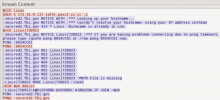GnuTLS Bug Leaves Linux Users Vulnerable To Hacks
A variety of Linux distributions are vulnerable to hacks because of a bug that allows people to bypass security protocols to intercept and disseminate encrypted information. A member of the Red Hat security team discovered a bug in the GnuTLS library that allows hackers to easily circumvent the Transport Layer Security (TLS) and secure sockets layer (SSL).












































































